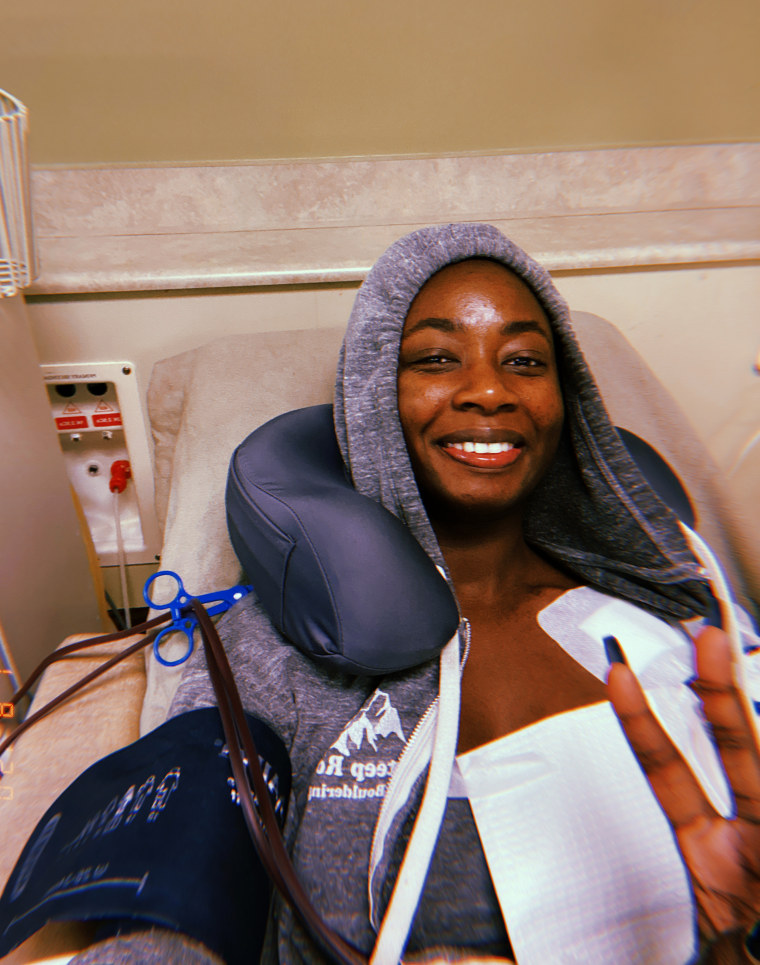I am a poet, Cincinnati native, Bronx-bred introvert, Los Angeles resident, mental health advocate, cat auntie, Tom Hardy lover and “The Office” fanatic. And I need a kidney transplant.
In October 2018, I was diagnosed with end-stage kidney failure resulting from lupus. My entire world collapsed.
Hundreds of organs being mishandled and lost in transit is so appalling. Every one of those organs is a shot at life, and yet they are being treated like old luggage.
Three times a week for 3 1/2 hours since then, I have had to wake up at 3 a.m. to go to dialysis. On the days I have treatment, I am barely myself. My energy is low and I’m constantly nauseous. I have a permanent catheter on my stomach and it attracts lots of unwanted stares.
Now, in the age of COVID-19, dialysis is even scarier than it used to be. Not only do dialysis patients have kidney disease, which leaves us prone to infections, but most of us need to crowd into dialysis centers with other patients and staff multiple times per week and therefore cannot socially isolate.
At 28, I should care about making out on the dance floor, unpaid parking tickets and marathon-watching the show “Fleabag.” I should be busying my days with travel and thinking about my next tattoo. Instead, my schedule is doctors appointments and surgeries and medication and protecting my compromised immune system.
I mourn the person I was before knowing my life would never be the same again.
As hard as it is, I know I’m stuck with dialysis unless I get an organ transplant and can begin to live normally again. So I’m standing by alongside 112,000 other Americans — most of whom are waiting for kidneys, though others need hearts, lungs, livers and other organs.
That’s why the investigation by Kaiser Health News and Reveal from the Center for Investigative Reporting published by NBC News earlier this year about hundreds of organs being mishandled and lost in transit is so appalling. Every one of those organs is a shot at life, and yet they are being treated like old luggage. As I’ve learned, this is just one problem in a horribly broken organ donation system.

Organ donation in this country is run by a system of government contractors called organ procurement organizations, or OPOs, that have monopolies over the areas they cover. OPOs are charged with coordinating how the most precious gift a person could give is recovered from a deceased donor and gets to a person waiting for a transplant.
There’s a lot of evidence that many of these contractors are failing on a very basic level. Research out of the University of Pennsylvania shows that up to 28,000 organs per year (including 17,000 kidneys) are not recovered, owing largely to poor performance and lack of accountability, including things as basic as ensuring staff are available to show up at the hospital.
And then, as the Kaiser investigation detailed, 540 organs recovered for transplant — mostly kidneys — were lost, delayed, damaged or otherwise jeopardized while in transit in recent years because of basic logistical issues, including outmoded technology in which lifesaving organs are “typically tracked with a primitive system of phone calls and paper manifests, with no GPS or other electronic tracking required.”
Unfortunately, that’s not even the whole picture.
For example, the organ procurement organization that serves Los Angeles, where I live, is one of the worst in the country. One analysis showed it only recovered 31 percent of potential organ donors. Audits in previous years found that LA’s OPO has misspent taxpayer dollars on retreats to five-star hotels and Rose Bowl tickets. The CEO makes upwards of $750,000. Even still, the LA OPO has not lost its government contract.
This is not an anomaly. Indeed, not a single organization overseeing organ procurement has lost a government contract in decades, even though the U.S. Department of Health and Human Services recently found that the majority of the country is being served by an organ procurement agency that doesn’t meet the latest standards. Every time one fails, another waiting-list patient — like me — is robbed of a lifesaving transplant.
Thankfully, some policymakers have begun to wake up to the problem. Rep. Katie Porter, D-Calif., is asking the Department of Health and Human Services to look into the contractor in Los Angeles; Sens. Chuck Grassley, R-Iowa, and Ron Wyden, D-Ore., are leading oversight by investigating failures in the system as a whole. And the Trump administration has a proposal to completely transform the way government evaluates OPOs and holds them accountable.
That all of these radically different politicians agree on the need for reform of organ procurement groups speaks to how remarkably clear the problems — and solutions — are.
That all of these radically different politicians agree on the need for reform of organ procurement groups speaks to how remarkably clear the problems — and solutions — are. The federal government should move as swiftly as possible to hold these organizations accountable for failing to serve the patients who rely on them. The only question left is whether these policymakers have the will to see them across the finish line. With COVID-19 bringing new and deadly risks to hundreds of thousands of kidney patients across the country, I sincerely hope so.
My dream is to have a healthy body, a working kidney and a life that is mine. To Congress and the Trump administration: Please get the job done. Thousands of lives literally depend on it.

